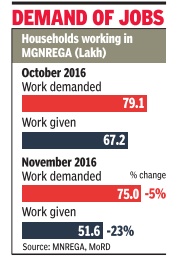MG NREGS (Mahatma Gandhi National Rural Employment Guarantee Scheme)
This is a collection of articles archived for the excellence of their content. |
Annual statistics
October-November 2016

The Times of India, Dec 13 2016
MGNREGA hires plummet by 23% in notebandi November
Subodh Varma The Modi government's demonetisation move seems to have taken the wind out of the sails of an already faltering job guarantee scheme. The number of households getting work in November dropped by 23% compared to the previous month and those being turned back empty-handed jumped to a staggering 23.4 lakh, almost twice the number in October.
Compared to the same month last year, work given this November is down by over 55%, indicating this is not a seasonal decline peculiar to November. With the overall emp loyment situation grim, this dip in jobs is expected to increase distress in rural areas. If there was work available (in MGNREGA), we would have got some relief at least. Now we get casual labour work at just Rs 50 per day , sometimes. Mostly we are just sitting, waiting,“ says Suniya Laguri, a 20-year old woman in Jharkhand's West Singhbhum district.
Suniya is voicing a concern that finds echoes across India in greater or lesser measure. Rural wages have crashed due to non-availability of cash as well as the desperation of the poorest -agricultural labourers and small or marginal farmers -to try and earn something in order to survive.
Mangoo Ram of Hardoi district in UP says his family survived the first few weeks by getting basic food items on credit and cutting down on an already minimal consumption. But now, in the fifth week of demonetisation, the situation is dire.
Most of the wages earned for work under the job guarantee scheme are deposited in banks or post offices. So, why has work itself suffered so much? The answer is not clear, with people citing different reasons. Shankar Singh of advocacy NGO Mazdoor Kisan Shakti Sangathan in Rajasthan says everybody -MGNREGA employees as well as people seeking work -were too preoccupied with standing at banks or post office lines for the first few weeks. This directly affected the whole system.
“Already , there was a squeeze on expenditure, with government not releasing adequate funds and gram panchayats overstretched. Notebandi has come on top of that, that is why this problem,“ Singh said.
Till December 12, gram panchayats were in the red to the tune of an incredible Rs 37,000 crore, according to the latest financial summary available with the rural development ministry .
That is, they had spent this much money but had yet to receive it from the top.
On the other hand, state governments had with them more than Rs 13,000 crore in funds that were yet to be transferred downwards.
There seems to be some efficiency issue also: in some states, work given under the scheme in November is not as bad as in others.
But the resultant ripples are evident all round.
The main issue is that banks are just not getting enough cash to dispense and people are waiting 4-5 hours to get Rs 200. Many return without any money .
With the reported return of thousands of migrants, the situation has worsened in rural areas as there is an army of unemployed in villages. Sowing for rabi (winter crop) is in progress but it cannot absorb everybody . This was the right time for the job guarantee scheme to open its doors wider and provide much needed relief. But that was not to be.
Fund allocation: 2013-16
Half of the fund allocation under job scheme MGNREGA goes to five states, but only two of them, Uttar Pradesh and West Bengal, rank high on the poverty list.
The paradox that poor states are not partaking of “distress labour“ scheme has been underlined by the Sumit Bose committee set up to analyse welfare schemes of the rural development ministry and suggest ways to prioritise beneficiaries.
A break-up of the fund flow under the job scheme between 2013-2016 shows that Andhra Pradesh (AP), Tamil Nadu (TN), UP, Bengal and Rajasthan have accounted for half of the allocations. AP, TN and Rajasthan are low on the list of deprivation or degree of poverty. In contrast, Bihar and Maharashtra are not among the top five states despite having “greater concentration of deprived households“, as mapped by rural household survey socio-economic caste census (SECC).
The expert panel's findings are in consonance with the general understanding that hard labour offered by MGNREGA should have greater demand from states with higher degree of poverty . The Bose panel has recommended that the scheme's focus should be more on poor regions.
Insiders acknowledge the paradox but attribute it to the nature of MGNREGA which is universal and demand-driven. Sources in rural development ministry said the scheme cannot be selectively focussed on poor states as it has to respond to demand whereever it emanates from. An earlier attempt to focus only on 2500 backward blocks kicked up a major controversy in 2015. However, a top official said the skewed relationship between poverty and work demand has been noticed and the ministry is building systems to help poor regions leverage MGNREGA better.Sources said instead of limiting the scheme to poor areas, the ministry has launched a concerted campaign to target families which have reported deprivation under SECC.
All gram panchayats have been asked to ensure that deprived households are issued “job cards“ so that they are encouraged to seek work.The campaign has a special focus on 2569 poorest blocks, as identified by the erstwhile plan panel. “The labour budget and employment has shot up in Rajasthan, UP , Chhattisgarh, Jharkhand, Assam, Odisha in 2016. We've tried to push up work there,“ he said.